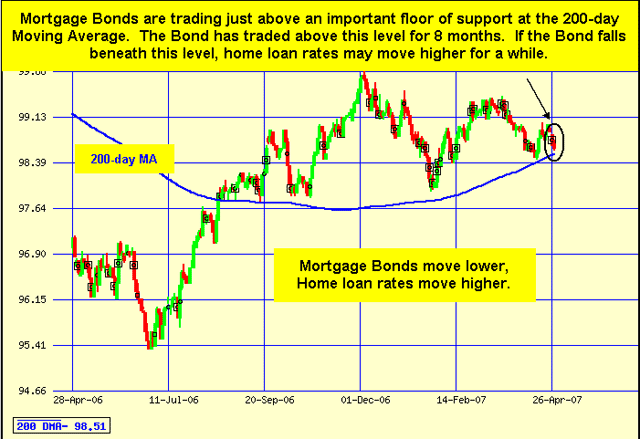Last Week in Review |
|
"THE ONE FUNCTION THAT TV NEWS PERFORMS VERY WELL IS THAT WHEN THERE IS NO NEWS - WE GIVE IT TO YOU WITH THE SAME EMPHASIS AS IF THERE WERE." David Brinkley No kidding...and although the week did start out with little real economic news for talking heads to deliver with drama, the calendar picked up steam in a hurry. Mixed news arrived for both New and Existing Home Sales - and on the heels of the recent strong housing starts and building permits that had the bad-news loving media choking, they attempted to paint a very dismal picture on housing - but it should be taken with a grain of salt. Most closings in March were likely originated in February, which was an incredibly cold month across the US - not the best month to be out home shopping or mucking around construction sites. With spring on the way, there could be some strength in housing in the upcoming months. This week also brought an interesting report called the Employment Cost Index - one of former Fed Chair Alan Greenspan's favorites - which measures the change in employment costs like wages and benefits. This report showed that costs are increasing, with wages increasing by 3.6% and benefit costs increasing by 3.1% over the past year. So not only are employers having to pay more in salaries due to a tight labor market, but the benefits they are providing to their employees are costing more too. What's a business owner to do? You got it - consider raising the price of their goods and services to cover the rising costs of their employees...and higher prices means inflation. Not good news for inflation-hating Bond prices and home loan rates, which lost the improvements made earlier in the week and ended unchanged to slightly worse for the week overall. THE JOB MARKET IS TIGHTENING, AND A COLLEGE EDUCATION IS MORE IMPORTANT THAN EVER - YET 97% OF AMERICAN FAMILIES HAVE NOT PLANNED PROPERLY FOR THEIR CHILD'S COLLEGE FUND. THINK YOU'VE GOT ALL KINDS OF TIME BECAUSE YOUR KIDS ARE YOUNG? WAITING COULD COST YOU...READ THIS WEEK'S MORTGAGE MARKET VIEW FOR A CAUTIONARY TALE OF TWO PARENTS, AND LEARN WHY YOU SHOULD GET STARTED SAVING RIGHT AWAY. |
Forecast for the Week |
|
This week's economic calendar is front and back-end loaded with potentially high impact reports. Right out of the gates, Monday brings the Personal Income and Spending report with the imbedded Core Personal Consumption Expenditure Index, the Federal Reserve's most favored gauge of inflation. Expectations are for Core Inflation to be reported at 2.2%, inching closer to the Fed's target of 2% or lower. Not to be outdone, Friday is launch-day for the potentially explosive monthly Jobs Report with the latest data on new job formation, hourly earnings, and the unemployment rate. Estimates for new job creations are presently around 100,000. If either of these reports are out of line - showing more inflation than expected or markedly more jobs than expected - this could cause Bond prices and home loan rates to suffer. And on the flip side - if the reports show low inflation or fewer job creations than anticipated, this could help Bond prices and home loan rates improve. Mortgage Bonds are now trading within a few whiskers of a very important technical floor of support at the 200-day Moving Average. Why is this floor so important? The chart below shows that Bonds have traded above this floor for eight months - and the last time Bonds traded beneath this level, the 200-day MA became a tough overhead ceiling of resistance, putting a lid on Bond prices or home loan rates improving for one and half years. So...if the news of this week forces the Bond beneath this 200-day MA floor of support, it may mean higher home loan rates for a while. Chart: Fannie Mae 5.5% Mortgage Bond (Friday Apr 27, 2007)
|
The Mortgage Market View... |
|
A TALE OF TWO PARENTS... In today's world, a college education is more important than ever. Many of the jobs that do not require a college degree have been outsourced to workers in other countries, or replaced by a computer or machine. And according to Fed Chairman Ben Bernanke, the income disparity between college grads and non-grads is growing every year. In 1979, college grads earned 38% more than those with only a high school diploma - but today, college grads earn 75% more than those without degrees. But let's face it, college is expensive, and becoming more so every day, inflating at around 5% per year historically. If anything, the cost will continue to rise as the upcoming high school graduating classes are expected to be the largest in history. The demand for four-year colleges will likely increase and with the number of seats in the classrooms still the same, expansion of space will probably not be an option for colleges and universities, but bumping the price tag certainly will be. And the type of college your child attends can have a big effect on the cost too - for just one year of tuition, room and board, an average private college runs just over $30,000, a public out of state college around $19,000, and even a public in state college is close to $13,000. So as a parent who wants your child to have the chance to attend college - what can you do? Plan early. Let's look at a tale of two parents to illustrate how important it is to get started right away. The preschool open house was in full swing, and two parents were chatting over the punchbowl, remarking on how they knew time would fly, and before you know it - their kids would be off to college. Taylor's parents are prepared, having recently sat down with a mortgage professional and learning that to completely fund Taylor's four year education at the local college would cost either $300 per month in savings - or by being able to tap into the equity in their home, only $133 per month after tax. "What a relief to know it's all taken care of!" they commented to Max's parents. But Max's parents replied, "Hey, what's the rush? Look, the kids are only knee-high right now...we'll worry about this later." Seven years later, the kids are in 5th grade, and the parents meet up again at a birthday party. College comes up in the conversation, as Max's parents just learned that for him to attend the very same college as Taylor, it will now require them to save $835 per month to be ready on time, which is not something they are prepared to do. Taylor's parents recommend that they meet their trusted mortgage professional, who advises them that by using the mortgage wisely, it will only cost them $260 per month after tax. Much easier to swallow - but it's twice as much per month as Taylor's parents, who planned ahead and started earlier. The moral to this story? If you want to save for a college education for your child, start the investment early. And encourage your children to invest and save too, with a portion of funds from their allowance or a side job like mowing the neighbors' lawn or babysitting. They will see how the value of their savings grows over time, and most importantly, will help instill the importance and value of a college education to your child. And as the college years approach, explore scholarships, financial aid, or federal direct aid, which is money that does not have to be repaid. When your child is young - you just don't know if they will be a star athlete or straight A student - so always better to plan ahead, and if scholarship money does become available, what a wonderful problem to have more than enough money in savings, due to your good planning. Let me know how I can help - if you want to discuss options and strategies on saving for your child's college education, contact me and we'll get started right away! |
The Week's Economic Indicator Calendar |
|
Remember, as a general rule, weaker than expected economic data is good for rates, while positive data causes rates to rise. Economic Calendar for the Week of April 30 - May 04
|


Comments(0)